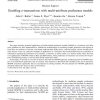Free Online Productivity Tools
i2Speak
i2Symbol
i2OCR
iTex2Img
iWeb2Print
iWeb2Shot
i2Type
iPdf2Split
iPdf2Merge
i2Bopomofo
i2Arabic
i2Style
i2Image
i2PDF
iLatex2Rtf
Sci2ools
EOR
2008
2008
Enabling e-transactions with multi-attribute preference models
This paper describes potential applications of multi-attribute preference models (MAPM) in e-commerce and offers some guidelines for their implementation. MAPM are methodologies for modeling complex preferences that depend on more than one attribute or criterion, and include multi-attribute utility theory, conjoint analysis, and the Analytic Hierarchy Process. There are numerous examples of applications in e-commerce that would benefit from the acquisition of information regarding the preferences of a consumer, a customer, an advice seeker, or a decision maker. Here, the focus is on applications of MAPM models in B2C and B2B websites, where preferences of consumers are assessed for the purpose of identifying products or services that closely match their needs. In this paper, we provide an overview of decision aids with the MAPM approach, emphasizing how the MAPM structure of an individual's preferences may be assessed. This discussion is illustrated with examples of the use of al...
| Added | 10 Dec 2010 |
| Updated | 10 Dec 2010 |
| Type | Journal |
| Year | 2008 |
| Where | EOR |
| Authors | John C. Butler, James S. Dyer, Jianmin Jia, Kerem Tomak |
Comments (0)

